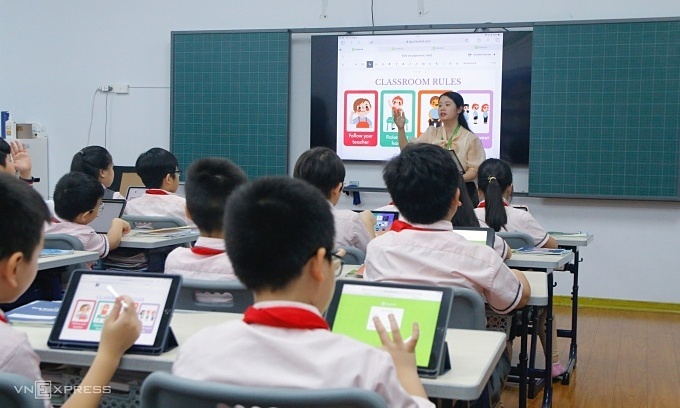Asia’s English proficiency drops from 2023: report
Students learn science in English at Hanoi Star Primary & Secondary School in Hanoi, December 2023. Photo by Read/Thanh Hang
Several Asian countries saw their English proficiency drop over the past year, especially China and India, whose ranking dropped by nine places.
An Education First report on the global English Proficiency Index in 2024, issued last week, revealed that English proficiency in several Asian regions has dropped more from last year compared to other regions of the world.
The main contributors were China and India, whose English proficiency ranking dropped by nine places from last year. This year, China’s English proficiency ranking was placed at 92nd out of 116, while India’s was at 69th place.
Other Asian countries with major drops in English proficiency ranking were Japan (87th to 92nd), Thailand (101st to 106th) and Cambodia (98th to 111th). Vietnam’s ranking dropped by five places to 63rd.
Only four out of 23 surveyed countries in Asia saw improved English proficiency ranking: Nepal, Kyrgyzstan, Kazakhstan and Tajikistan.
Singapore remains the highest-ranked Asian country, scoring 609 points and ranking 3rd globally. Singapore is the only Asian nation in the “very high proficiency” category, with a score above 600. Vietnam ranks 8th among the 23 countries and territories in Asia.
The Netherlands tops the ranking globally with 636 points, followed by Norway with 610.
The 2024 English Proficiency Index is based on the results of EF SET tests taken by over 2.1 million non-native English speakers aged 18 and older.
According to Kate Bell, the report’s author, global English proficiency has been declining for the fourth consecutive year. He noted that 60% of the ranked countries and territories recorded lower scores than in the previous year, with the largest declines observed in Asia.
EF is one of the world’s largest academic institutions. The English Proficiency Index report has been issued annually since 2011.


Comments are closed.